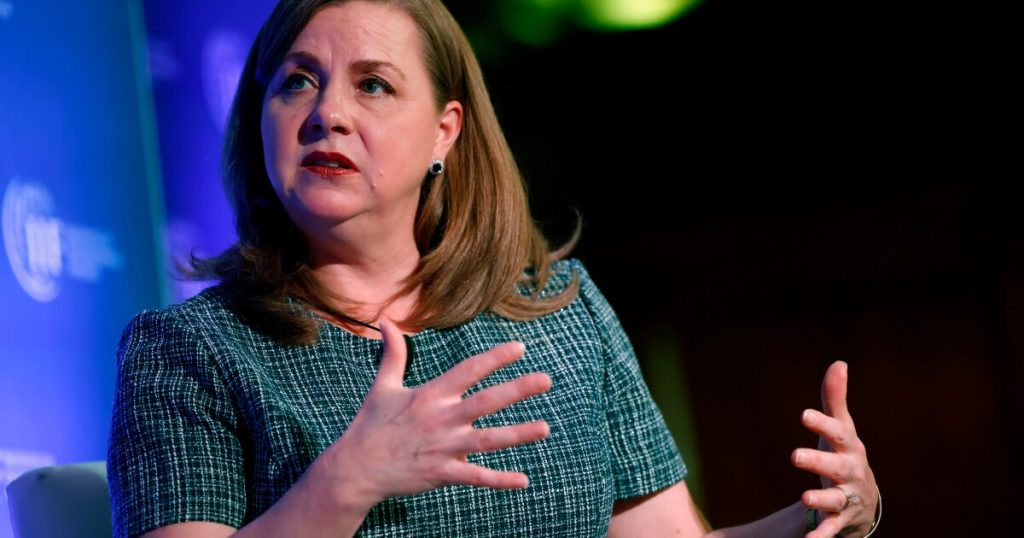Bloomberg News
Federal Reserve Gov. Michelle Bowman is the latest official to speak out against policies that encourage banks to drop law-abiding customers.
In remarks delivered Friday morning at the New England CEO Summit, Bowman said regulation and supervision should be focused squarely on managing risks to the safety and soundness of the banking system, and implemented in ways that do not curb access or the flow of credit.
“Bank regulatory policy should be used to address the needs of the unbanked and expand the availability of banking services,” she said. “It should not be used to limit or exclude access to banking services for legitimate customers and businesses in a way that is meant to further unrelated policy goals, sometimes referred to as ‘debanking.'”
The comment was in the context of climate-related supervision by the Fed and other federal regulators. She argued that guidance issued by the agencies on risks related to climate change or policies that respond to it — also known as transition risks — push “the boundaries of appropriate regulatory responsibilities.”
Bowman’s comments come at a time of enhanced focus on so-called debanking practices, in which banks terminate the accounts of customers. Typically, this is done when the customer in question is engaged in activity deemed suspicious, with money laundering concerns frequently cited as a driving force. The issue of debanking is particularly salient among cryptocurrency users and issuers, many of whom have allegedly lost account access in recent years.
President Donald Trump
Trump’s remarks also drew the attention of the banking industry. Greg Baer, head of the Bank Policy Institute, issued a statement blaming the uptick in debanking on overly restrictive anti-money laundering policies and supervisory pressure. Earlier this week, Fed Chair Jerome Powell said bank
Bowman’s comment on debanking and other regulatory matters come at a time when she could soon be in a position to affect the Fed’s related policies more directly. She is among the
Bowman’s speech also touched on a broad range of other regulatory and supervisory issues, including merger and acquisition review practices, capital requirements and tailoring principles for bank oversight.
Bowman called for changes to expedite the review process on bank applications, including those for novel charters as well as mergers and acquisitions. She said the current slow pace for rendering decisions has had a chilling effect on the industry.
“We need to have a regulatory system in which both de novo bank formations and M&A transactions are possible,” she said. “Viable formation and merger options for banks of all sizes are necessary to avoid creating a barbell of the very largest and very smallest banks in the banking system, with the number of community banks continuing to erode over time.”
During her remarks, Bowman called specifically for changes to the capital standards and treatments applied to mutual banks, noting that such institutions should be allowed to use mutual capital certificates to satisfy capital requirements. Unlike most banks, mutuals are owned by depositors rather than shareholders, a status that she said can make raising capital difficult.
“In my view, the banking agencies should be receptive to [mutual capital certificates] to ensure that mutual banks can both raise capital and maintain their depositor-owned structure,” she said. “Mutuals need clarity and transparency about the regulatory treatment of these instruments and whether they qualify as regulatory capital.”
Bowman urged regulators to be clearer in their communications around changing policies and emerging risks. She also warned about the dangers of so-called regulatory and supervisory “trickle-down,” in which regulatory requirements applied to large banks are extended to smaller banks via examiner expectations.
Bowman said this “trickle-down” effect is exacerbated by regulatory thresholds, which have not been adjusted for inflation for years. Many banks that are structured and behave like community banks are treated like larger banks, she said, simply because their assets have grown organically over time.
“The regulatory asset ‘line’ defining community banks has remained constant at $10 billion in assets for over a decade. During that time, the economy has grown significantly, and inflation has rendered this asset definition obsolete,” she said. “Many ‘community banks’ — as defined by business model and activities rather than asset size — now exceed the threshold and must comply with broader regulatory requirements that may be excessive.”

